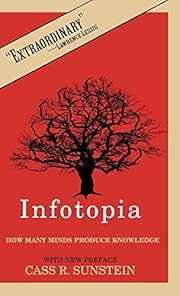

Cliquer sur une vignette pour aller sur Google Books.
|
Chargement... Infotopia: How Many Minds Produce Knowledge (original 2006; édition 2006)par Cass R. Sunstein (Auteur)
Information sur l'oeuvreInfotopia: How Many Minds Produce Knowledge par Cass R. Sunstein (2006)
 Aucun Actuellement, il n'y a pas de discussions au sujet de ce livre. My review is at http://blog.tarn.org/2009/01/30/book-review-infotopia/. It concludes as follows. Infotopia provides a valuable and informative summary of some important concepts. Its measured and thoughtful tone stands out amongst works of a more evangelical nature that cover similar ground, and is therefore highly recommended. There are gaps, but perhaps in time those will be filled by others. Meine Rezension befindet sich hier: MBI Blog Smart, well thought out, and balanced book. The best book I've read about the implications of Wikipedia, blogs etc. It reads like the first half of a book, and I kind of wish he'd waited until he had some more concrete conclusions. But maybe it's not a bad thing to have an open ended book on this subject. I recommend it. http://www.worldchanging.com/archives/005507.html - review by Ethan Zuckerman.
"This book is, essentially, about the democratic processes of the Internet from blogs and wikis to 'prediction markets'."
The rise of the "information society" offers not only considerable peril but also great promise. Beset from all sides by a never-ending barrage of media, how can we ensure that the most accurate information emerges and is heeded? In this book, Cass R. Sunstein develops a deeply optimistic understanding of the human potential to pool information, and to use that knowledge to improve our lives. In an age of information overload, it is easy to fall back on our own prejudices and insulate ourselves with comforting opinions that reaffirm our core beliefs. Crowds quickly become mobs. The justification for the Iraq war, the collapse of Enron, the explosion of the space shuttle Columbia-all of these resulted from decisions made by leaders and groups trapped in "information cocoons," shielded from information at odds with their preconceptions. How can leaders and ordinary people challenge insular decisionmaking and gain access to the sum of human knowledge? Stunning new ways to share and aggregate information, many Internet-based, are helping companies, schools, governments, and individuals not only to acquire, but also to create, ever-growing bodies of accurate knowledge. Through a ceaseless flurry of self-correcting exchanges, wikis, covering everything from politics and business plans to sports and science fiction subcultures, amass-and refine-information. Open-source software enables large numbers of people to participate in technological development. Prediction markets aggregate information in a way that allows companies, ranging from computer manufacturers to Hollywood studios, to make better decisions about product launches and office openings. Sunstein shows how people can assimilate aggregated information without succumbing to the dangers of the herd mentality--and when and why the new aggregation techniques are so astoundingly accurate. In a world where opinion and anecdote increasingly compete on equal footing with hard evidence, the on-line effort of many minds coming together might well provide the best path to infotopia. Aucune description trouvée dans une bibliothèque |
Discussion en coursAucunCouvertures populaires
 Google Books — Chargement... Google Books — Chargement...GenresClassification décimale de Melvil (CDD)303.4833Social sciences Social Sciences; Sociology and anthropology Social Processes Social change Causes of change Development of science and technology Communication, information technologyClassification de la Bibliothèque du CongrèsÉvaluationMoyenne: (3.62) (3.62)
Est-ce vous ?Devenez un(e) auteur LibraryThing. |
|||||||||||||||||||||||||||||||||||||||||||||||||||||||||||||||||||||||||||||||||||||||||||||||||||||||||||||||||||||||||||||||||||||||||
While I take Sunstein's primary goal in this work to be the propagation of price systems and private markets as valuable information aggregation tools, my interest was primarily in the deliberative pathologies elaborated in the middle chapters. A clear secondary goal in this book was the undermining of deliberative accounts of democracy, which point to the epistemic value of the public deliberative process as playing a major justificatory role for systems of self-rule. I'm not certain I've finished sifting through Sunstein's argument in my mind, but at a preliminary level I'll say that I have some concerns about how quickly he moves from deliberative pathologies which manifest in deliberation over factual issues with discrete answers to a generalization to political and moral thought. While I'm sympathetic to the claim that the results do generalize, I'm not sure that he's given adequate foundation for the move.
Overall, a quick and enjoyable read. The book should be accessible to just about anyone, not only social scientists or political theorists, and gives good food for thought. Generally recommended if you have any interest in the topics. (